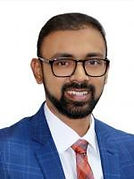
The Bharat Pacific is a digital media consortium that brings together leading experts, professionals, and scholars from various fields of technology, governance, public policy and international relations. We are governed under The Bharat Pacific Charter.
The consortium, supported by the Indian Society of Artificial Intelligence and Law, offers unique and curative content through podcasts on global governance, technology policy, and international relations in the Indo-Pacific region.
The Bharat Pacific Blog

How Do Artificial Intelligence Assistants Interact with People?


The Capabilities in Microsoft Azure's AI/ML System: A Mini Primer


AI for Marketing: A Mini Primer


Can AI Enable Equitable Lending?


EU, A Pragmatic or a Defeatist ?


EMOTIONAL ARTIFICIAL INTELLIGENCE


RAISE, 2020 AI Summit - An Overview


An AI Perspective on the Indian "Guardians of Galaxy"


Which AI Tools Should You use for Gamification in Your Company?

Position Statement on Investment of ADIA in Jio Platforms Limited


“Gamification” of Recruitment Process: A Potential Disruption or A Hype?


Is Artificial Intelligence the Future of the Legal Sector?

Position Statement on Global Algorithmic Trading Software Market Discussed in the OrbisMarket Report
The Bharat Pacific Principles
In line with the Schedules 1 & 6 of AiStandard.io Alliance (AI Standardisation Alliance) Charter, the Indian Society of Artificial Intelligence and Law expresses interest to partner with like-minded entities, institutions and bodies to further our goals of AI standardisation in India, and the Indo-Pacific, by engaging in suitable knowledge partnerships to document, build capacity bridges, and steer through more acceptable and evolving AI-related market practices for businesses, individuals, researchers, developer communities, government bodies and non-profit entities.
Each principle has a Stakeholder Identification Matrix (as per Schedule 1 of the AiStandard.io Alliance Charter), which signifies the emphasis of the respective principles with specific categories of government institutions, communities and organisations.
To engage in genuine partnerships with us, please read the Schedule 6 of the AiStandard.io Alliance Charter, and feel free to contact us.
If your organisation is inspired by any of our principles, you may pledge commitment of these non-binding consultative principles by citing them appropriately. Click on any of the principle and cite your specific commitment to any of the principles, accordingly.
The Bharat Pacific Principles of Artificial Intelligence Standardisation
The Lucknow Principles on Artificial Intelligence, Development & the Evolution of Work [The Lucknow AI Principles]
The Orchha Principles for AI and Copyright in the Digital Age [The Orchha AI Principles]
The Durgapur Principles on Mitigating Artificial Intelligence Hype and Enabling Careful Marketing Practices [The Durgapur AI Principles]
Our Podcasts.
We have an assorted collection of media interviews, podcasts, and roundtables on artificial intelligence, international relations, legal education and strategic issues.

Thought leadership
Since our inception in 2018, we have had the privilege of hosting several notable thought leaders who have shared their deep experience and expertise in the worlds of public policy and international relations. Our platform provides a space for "out of the box" and "inside the box" discussions that shape an Indian outlook towards public policy innovation.
Check out our video interviews and podcasts on Spotify and YouTube.
Thought Leaders featured on The Bharat Pacific
We have featured and hosted several thought leaders and experts in our podcast interviews and panel discussions.
Dhruva Jaishankar
ORF America

Marc Finaud
Geneva Center for Security Policy

Pravin H Parekh
Supreme Court of India & the Indian Society of International Law

Dexter Roberts
Author, "The Myth of Chinese Capitalism"

Velina Tchakarova
Austrian Institute of European and Security Policy

Patrick Mercer OBE
Historian and Former MP (UK)

Brigadier (Rtd) Ben Barry
International Institute for Strategic Studies

Brian Polkinghorn
Bosserman Center for Conflict Resolution

Roger Brownsword
King's College London

Akshobh Giridhardas
Observer Research Foundation

Dr Sana Hashmi
Taiwan-Asia Exchange Foundation

Rupak Chattopadhyay
Forum of Federations

Sanjay Notani
Economic Laws Practice

Aditi Jha
MIT Sloan School of Management

Shanthie Mariet D'Souza
Middle East Institute

Gregor Strojin
Council of Europe & Supreme Court of the Republic of Slovenia

Maksim Karliuk
International Development Law Organisation

Vasabjit Banerjee
Mississippi State University
(1).jpeg)
Ruchir Sharma Jr.
Independent Analyst on India and European Foreign Relations

Jyotsna Mehra
Pacific Forum & South Asian Voices

Dr Robert Lyman FRHistS
Changing Character of War Centre, Pembroke College, University of Oxford

Ankit Sahni
Advocate and IP Law Specialist
.jpeg)
Dr Jeffrey Funk
Technology Consultant

Pallav Pradyumn Narang
CNK RK
.jpeg)
Dr Nanda Kishor
Pondicherry University

Bogdan Grigorescu
Afiniti

Manoj Kewalaramani
Centre for Strategic & International Studies

Sumantra Maitra
Centre for the National Interest & the Royal Historical Society, UK

Meyyapan Negappan
Trilegal

Tony Pietrocola
Agile Blue

Simon Anholt
Author, "The Good Country Equation"

Salvatore Babones
Political Sociologist
.png)
Ruchita Beri
Manohar Parrikar Institute for Defence Studies and Analyses

Vivek Mishra
Observer Research Foundation

Prateek Sibal
UNESCO

Dr Thibault Schrepel
VU Amsterdam & Network Law Review

Utpal Chakraborty
Allied Digital Services

Alex Hochuli
Author, "The End of the End of History"

Rishap Vats
Independent Scholar in Indian Foreign Policy

Raghav Mendiratta
Justitia

Abhishek Mishra
Observer Research Foundation

Aashish Yadav
Jindal Global Law School




%20(3).png)





